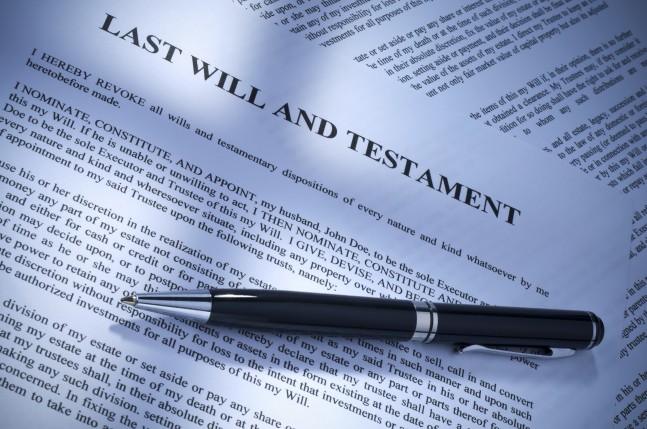Wills & Estate Planning Articles
Storage of Last Will in South Australia
October 21st, 2014 by | Deceased Estates & Inheritance Claims, Wills & Estate Planning
Often I am asked what happens to a Will once it has been executed. Many people have an expectation that there is some central storage area or register of Wills. In fact this is not the case and the storage of a Will is entirely in the hands of the willmaker. So well may you… Read more »
Joint Tenancy and Tenants-in-Common Confusion
July 31st, 2014 by | Conveyancing, Property & Leases, Wills & Estate Planning
Like all legal fictions, the most common forms of land ownership seem deceptively simple but in fact they can be quite complicated. Anna Pantelios provides a useful outline of the differences between joint tenancy and tenants-in-common from a conveyancing perspective in her article “Joint Tenants or Tenants-in-Common?” but confusion continues. The legal consequences of getting… Read more »
Advance Care Directives
July 9th, 2014 by | Wills & Estate Planning
The Advance Care Directives Act, 2013 (SA) came into operation on 1 July 2014. The Act allows adults to make legally binding arrangements for their future health care, end of life wishes, living arrangements and other lifestyle matters by appointing one or more Substitute Decision Makers in an Advance Care Directive (“ACD”) Form. Enduring Powers… Read more »
Untrustworthy Trustees
September 12th, 2013 by | Commercial Transactions, Court Disputes, Wills & Estate Planning
Trusts are appropriate legal structures in many circumstances. However even a well thought out trust structure supported by an excellent trust deed will fail the settlor’s aims if the trustee is untrustworthy. What is a Trust? A Trust is an arrangement where X holds or controls property for Y. In this case X… Read more »
Passing Control of Family Discretionary Trust
September 8th, 2013 by | Wills & Estate Planning
When making a will it is important to understand that you can only give what is yours. Assets owned via a family discretionary trust structure cannot be gifted directly in a will. If some or all of a will maker’s assets are owned through a trust, the will maker does not own the trust assets…. Read more »
Probate on Lost Will
September 7th, 2013 by | Deceased Estates & Inheritance Claims, Wills & Estate Planning
A Grant of Probate from the Supreme Court will generally be required for an executor to deal with the assets of a deceased. Obtaining a Grant involves proving that the last Will of the deceased is valid by producing it to the Court. Where a person dies without leaving a Will, then a Grant of… Read more »
Will Your Same-Sex Marriage Invalidate Your Will?
July 1st, 2013 by | Wills & Estate Planning
In recent years and even months, more and more jurisdictions around the world have been legislating to legalise same-sex marriage. It seems that Australia won’t be following suit in the near future. For this reason it has become attractive for same-sex couples to travel overseas to be married. The question therefore arises as to the… Read more »
Living Wills – Anticipatory Directions and Enduring Powers
June 16th, 2013 by | Wills & Estate Planning
The term “Living Will” can be misleading. What many people don’t realise is that a Will, specifically your “Last Will and Testament”, only has effect upon your death. You cannot use your Will to make directions about what should happen when you are ill or unable to take of yourself, for example. When people refer… Read more »
Enduring Power of Attorney and Enduring Power of Guardianship – Do I Need Both?
May 21st, 2013 by | Wills & Estate Planning
I am often asked the difference between an Enduring Power of Attorney and an Enduring Power of Guardianship*. Many people assume that when they appoint an attorney, that person assumes the role of decision maker in all aspects of their lives. But this is not correct, as the roles of Attorney and Guardian* are separate… Read more »
Duties of an Executor
November 24th, 2012 by | Deceased Estates & Inheritance Claims, Wills & Estate Planning
An executor is the person(s) or organisation chosen to carry out the terms of a will. The executor is responsible for the administration and control of a deceased estate until the final distribution of assets is made to the beneficiaries. The executor must first locate the deceased’s last will and contact the beneficiaries as soon… Read more »
Joint Tenants vs Tenants-in-Common
November 1st, 2012 by | Conveyancing, Property & Leases, Wills & Estate Planning
The consequences of not understanding the difference between joint tenants vs tenants in common can be costly. For example, how you own a property will determine whether your share of the property is passed down to your beneficiaries under the terms of your Will, or whether it becomes the property of the other surviving owners… Read more »
Are Shareholder & Partnership Agreements Really Necessary?
October 5th, 2012 by | Business Sale & Purchase, Commercial Transactions, Franchises, Wills & Estate Planning
Starting a business can be an exciting and rewarding experience. It can also quickly become a nightmare (even if the business is successful). Often it is difficult for an individual to find the finance necessary to start a business and so people look for partners. A partner can also bring to the business skills and… Read more »
Time Limits Apply to Most Legal Actions!
September 12th, 2012 by | Court Disputes, Debt Collection, Injury Compensation Claims, Wills & Estate Planning
You should be aware that there are time limits on certain Court actions. If you fall outside those time limits, your ability to pursue a remedy in Court may be lost (‘statute barred’). Examples of certain claims and the time limits that apply in South Australia: Breach of contract: 6 years after the date of… Read more »
Things to Keep in Mind When Making a Will
August 23rd, 2012 by | Wills & Estate Planning
Making a will is just one aspect of good estate planning. Of course you should also consider whether testamentary trust provisions would be appropriate and the benefits of an Enduring Power of Attorney and Enduring Power of Guardianship*. There are, however, a few other things your lawyer should be talking to you about … Jointly… Read more »


















